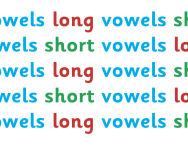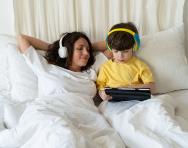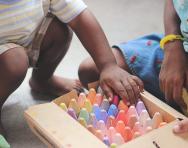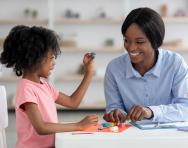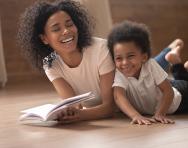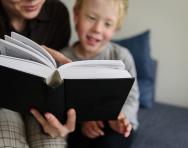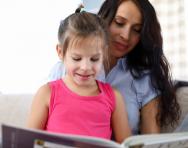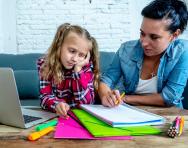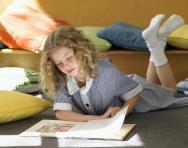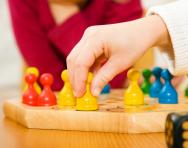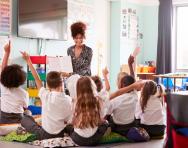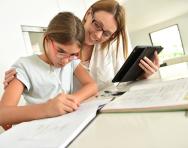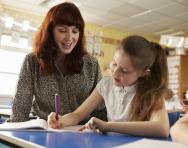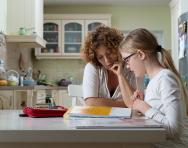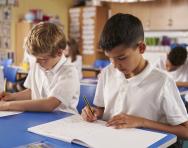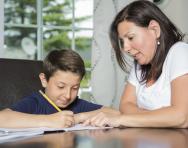How children learn articles
Teacher concerns: nearly half of school starters not ready
Matt Revill, experienced educator and primary-school headteacher, unravels recent findings about school starters and how new pupils struggle with basic skills to help them function in the classroom. In this week’s blog, he attempts to bridge the gap between what parents think and what teachers experience.
Parents' guide to Phase 6 phonics
Different primary schools use different ways to teach children about sounds and letters, called phonics. But most kids in early years and Key Stage 1 follow a set of steps, or phases, to learn phonics. In Phase 6, they deepen their phonics knowledge and use their skills to help them read and spell. Here, we'll explain what Phase 6 is all about and how you can help your child with it at home.
Developing social-emotional skills for a happier, healthier child
Developing social-emotional skills is key to your child’s long-term mental health and social capabilities, but it’s sometimes treated as a less important area of education. We asked young persons’ counsellor and children’s book author, Hannah Peckham, to share her advice on how to support this key area of development at home.
5 tips on inspiring your funny child to write jokes
Comedy is often an underrated learning tool. It can encourage your child to be creative, express their individuality and help them engage in reading, writing and performance. Encourage your child’s inner comedian with these tips from stand-up comedian, children’s author and comedy writer Steven Vinacour.
24 fun toys for summer outdoor learning
It's well established that outdoor play is important for young learners and provides opportunities to develop physical, social, fine and gross motor skills. Our editor, Kate Morgan, has put together her top picks of outdoor toys. So get the kids outside, having fun and learning this summer. Let the games begin!
What are short and long vowels?
Although we have five vowel letters in English, each one can be pronounced in different ways and there are, therefore, far more than five vowel phonemes (vowel sounds). Each one has a short vowel and a long vowel form. Understanding vowel sounds is essential for developing reading and spelling skills.
Performing arts: 7 ways it can boost your child's development
Acting, dancing and singing classes aren’t just for future stars of stage and screen. Enrolling your child in an extra-curricular performing arts class could be an amazing boost to their development and life skills. Here are seven surprising ways the performing arts could benefit your child.
Best audiobooks for primary school kids
Audiobooks are a wonderful way to enjoy stories, especially for those who struggle with reading. With so many to choose from, we've rounded up some of our favourite audiobooks for primary-school kids, so that you have a good place to start!
Is your child left-handed (and does it matter)?
With 90% of the world made up of right-handers, how does being left-handed affect learning at school? Hetty Walton, mum to left-handed daughter Isobel, 11, investigates.
How the daily learning programme works
Whether you're taking your child out of school for a period, setting out on your home education journey or simply looking for extra activities to boost your child's learning, here's why the daily learning programme could be the right fit for you...
Developing a learning style before starting school
Most of us want to give our children every advantage when they start primary school — it’s only natural. Finding the best school, taking an interest in feedback from teachers and doing homework is all great, but the best thing you can do for your child is to help them develop the key characteristics of being an effective learner.
5 surprising home habits that affect your child’s learning
What are the very best ways to support your child's learning and help them reach their full potential? In an extract from their handbook, A Parent’s Guide to The Science of Learning, Edward Watson and Bradley Busch suggest practical ways to help your child improve how they think, feel and behave in school, all backed by psychological research.
Helping your child get back into a school mindset
After time out of school, your child’s learning habits may be rusty. Here’s how to iron out those back-to-school problems and help them settle back into a learning mindset.
What is Positive Discipline?
Could you shake up the way you deal with bad behaviour and make your family a calmer, happier place? Here's how to put a positive spin on how you discipline your child.
What is working memory?
What role does short-term working memory play in children’s learning, and how can you help your child use it to their advantage? Steve Garnett, author of Cognitive Load Theory: A Handbook for Teachers, explains what parents need to know about working memory.
Best brain-training apps for kids
Help your child develop essential skills such as problem-solving, critical thinking and spatial awareness with these brilliant brain games.
How humour helps children learn
Find out why making learning a laugh can help your child succeed at school and how humour helps children learn and grow through jokes, riddles, funny books and comics.
11 ways to take your child's reading to the next level
Once you’ve encouraged your child's love of stories and boosted their confidence in their reading skills, it’s time to develop those strategies which really make your child ‘a reader’.
What is unschooling?
Ever fancied ditching school and letting your child learn through following their interests? The unschooled approach to home education could be right for you.
How to make online tutoring work for your child
Is your child preparing for the 11+ or getting support with general studies? Two tutors share their advice on making the most of online tutoring.
Best literacy resources
Whether your child is just learning to read and print letters or looking for ways to put their creative writing skills to the test, we've rounded up some fantastic resources to help them practise phonics, grammar, story-writing and comic-creating at home. Plus there are loads of different ways to connect with authors and listen to stories.
Special educational needs: navigating change
If your child with SEN is struggling with changes to their daily routine, read our advice on helping them cope during challenging times.
How to structure your day during homeschooling
Teacher Jennifer Smith shares her advice on how to help your child learn and structure your day when your child is temporarily out of school and learning from home.
Supporting summer-born children at school
Your child’s birthdate could make a big difference to how they manage at primary school. We asked the experts about the potential impact, and how you can help your child thrive.
Help your child learn to learn
Everybody learns differently, and many children struggle with traditional approaches to studying. Barbara Oakley and Terrence Sejnowski, authors of Learning How to Learn: A Guide for Kids and Teens, shine a light on creative (but neuroscience-backed) methods to help your child learn and think about learning differently.
How to help your child spot fake news
How good is your child at telling what’s true and what isn’t? We take a look at how to help them develop digital literacy and identifying "fake news" in our connected world.
13 ways playing board games benefits your child
Switch off the computer and get out a family board game – fun and learning guaranteed!
Relationships and sex education: your FAQs answered
How is Relationships and Sex Education changing and why is it so controversial? We did a little digging and spoke to experts to help us debunk some of the myths surrounding RSE in primary school.
Teaching kids about current affairs
How do we help children understand what's going on in the world in an age-appropriate way? We have top tips for helping them make sense of the news.
Teachers’ tricks for helping with homework
Fed up of fighting about homework? We asked the real experts – experienced teachers – how they help their own children with their home learning.
Could helping your child with homework actually hinder their learning?
What are the right – and wrong – ways to help with homework? We take a look at how to offer the most effective sort of parental support.
What is a visual timetable?
Many children benefit from having a predictable routine in their lives. Visual timetables can help them in the classroom and at home.
Working at greater depth: what it means for your child
How do schools extend children who've mastered the basic curriculum concepts? We take a look at what happens if they're 'working at greater depth'.
How rote learning benefits your primary school child
From times tables to play scripts, here's how learning by heart can give your child a boost.
How to help your child develop critical thinking skills
Being a critical thinker will help your child succeed at school and throughout their life. We asked Peter Worley of The Philosophy Foundation for his critical thinking tips.
How to build your child’s vocabulary
Help your child become a master of words with these great tips for boosting vocabulary at home.
Is your child’s vocabulary right for their age?
A wide vocabulary is a good indicator of how well your child will perform academically, but how can you tell if they’re on track?
How to keep your child motivated to learn
Do you wish your child would get on with their work without you nagging? Read our expert tips on building self-motivation.
What is a pupil referral unit?
We explain what to expect if your child is referred to a pupil referral unit (PRU), an alternative to mainstream school.
How to help your child learn more effectively
Is your child permanently discouraged by homework? Banish a defeatist attitude to learning with these brilliant proactive tips.





